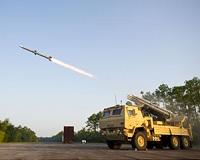| . |  |
. |
Dyess AFB TX (SPX) Sep 14, 2010 A Dyess Air Force Base B-1B Lancer carried a full load of 24 AGM-158 Joint Air-to-Surface Stand-off Missiles on a flight over the Gulf of Mexico, Sept. 7 - a first for the B-1 and AGM-158. "The mission was a success," said Maj. Brian Owen, the chief of wing weapons and tactics. "Everything went as planned, and we can verify that the B-1B can in fact operate its full capacity of JASSMs." The purpose of the flight was to ensure maintainers, ammo and munitions Airmen and B-1 aircrew are proficient in uploading, flying, employing and downloading the AGM-158 JASSM and to test all missile-related processes to see if there's room for improvement. None of the missiles were released during this test; they were system-checked while in the air. "Maintainers loading 24 JASSMs on one B-1 is a record-setting event," said Senior Master Sgt. Jeff Rud, of 7th Maintenance Group. "It's never been done before. The main reason we're doing this is for training. It's the cornerstone of all we do. It provides us the opportunity to hone our war fighting skills and gives us the opportunity to project our combat capability right here out of Dyess (AFB)." The B-1 is the most capable JASSM employment platform in the world, Major Owen said. "We've seen the engineering specs that say it's supposed to work, but it's never been done before," Major Owen said . "What makes the B-1 unique versus the other aircraft around the world is that we can employ these weapons on such a large scale. We can take off with two aircraft and have the capability to strike 48 different targets." The second most capable aircraft is the B-2 Spirit, carrying 16 JASMMs, followed by the B-52 Stratofortress with 12. The AGM-158 JASSM is designed to keep the jet and its crew a significant distance away from surface-to-air threats while still holding an enemy's targets at risk. The AGM-158A is a stealth cruise missile powered by a Teledyne CAE J402 turbojet that uses flip-out wings with control surfaces and a single vertical tail for flight control. It's guided by a jamming-resistant, GPS-aided inertial navigation system and uses an imaging infrared seeker for autonomous pattern-based target selection and terminal homing. The missile is armed with a 1,000 pound WDU-42/B insensitive munitions penetrating warhead, and accuracy is quoted within 8 feet. It is also equipped with a data link to transmit status and location information until impact, thus assisting in bomb damage assessment. "I've been in the aircraft maintenance business for more than 24 years, and anytime you have the opportunity to do something first, it is a real morale booster," Sergeant Rud said. "It gives us here at Dyess (AFB) bragging rights, and that goes a long way in terms of building pride in your unit and pride in the aircraft you work on. I have found that people love to do their primary job, whether it's ammo line delivery crews delivering bombs or weapons loaders loading bombs. "It's in these moments that people get energized when they see their part of an operation come together with the other pieces of the puzzle that makes them feel good about what they do," he said.
Share This Article With Planet Earth
Related Links US Air Force Learn about missile defense at SpaceWar.com All about missiles at SpaceWar.com
 Raytheon's SLAMRAAM Completes First FMTV Launcher Test Firing
Raytheon's SLAMRAAM Completes First FMTV Launcher Test FiringTewksbury MA (SPX) Sep 10, 2010 Raytheon's SLAMRAAM (Surface Launched Advanced Medium Range Air-to-Air Missile) system successfully participated in a ballistic test vehicle (BTV) firing at Eglin Air Force Base, Fla. The test included the firing of multiple AMRAAM missiles from the new Family of Medium Tactical Vehicle (FMTV) platform. The FMTV was chosen as the new platform for the SLAMRAAM system to increase survivabili ... read more |
|
| The content herein, unless otherwise known to be public domain, are Copyright 1995-2010 - SpaceDaily. AFP and UPI Wire Stories are copyright Agence France-Presse and United Press International. ESA Portal Reports are copyright European Space Agency. All NASA sourced material is public domain. Additional copyrights may apply in whole or part to other bona fide parties. Advertising does not imply endorsement,agreement or approval of any opinions, statements or information provided by SpaceDaily on any Web page published or hosted by SpaceDaily. Privacy Statement |